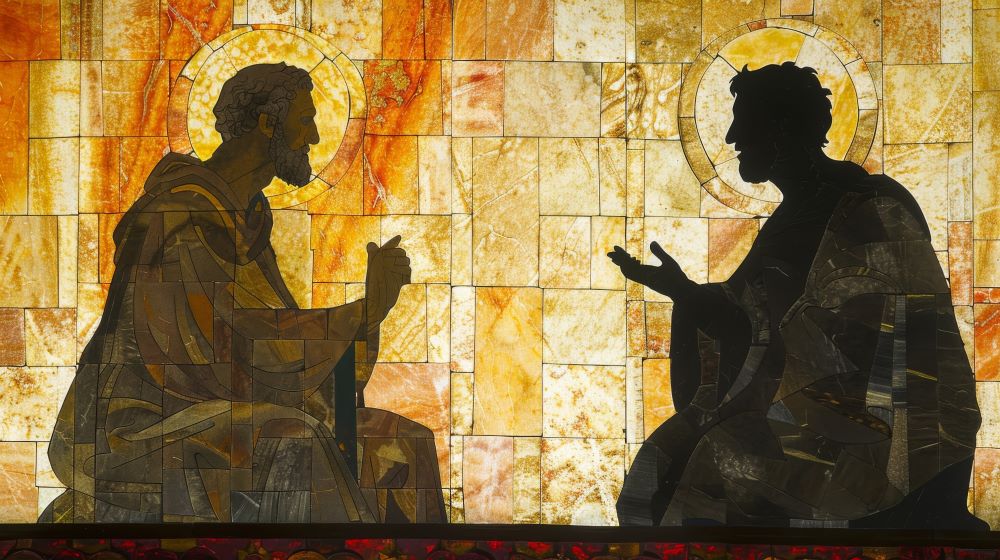
Scripture text: And when he had found him, he brought him unto Antioch. And it came to pass, that a whole year they assembled themselves with the church, and taught much people. And the disciples were called Christians first in Antioch.
THE REVELATION THAT THE NAME "CHRISTIANS" was bestowed upon the followers of Christ by Bishop Evodias of Antioch, who was one of the seventy disciples of Jesus during his earthly ministry, is a truly remarkable and significant fact. This insight challenges the commonly held belief that the term "Christian" originated as a derogatory nickname given by the Roman Syrians. Instead, it affirms that the name was inspired by the Holy Spirit and given through a faithful servant of God.
The importance of this truth cannot be overstated, as it speaks to the divine origin and purpose of the name "Christian." Throughout the Bible, we see that God is intimately involved in the naming of His people. In the Old Testament, God changed Abram's name to Abraham, signifying his covenant promise to make him the father of many nations (Genesis 17:5). Similarly, God changed Jacob's name to Israel, reflecting his transformation and the birth of a new nation (Genesis 32:28). These names carried deep spiritual significance and were not left to the whims of human invention.
In the same way, the naming of God's people in the New Testament bears the hallmark of divine inspiration. The fact that a bishop, who had walked with Jesus and witnessed His ministry firsthand, was the instrument through which the Holy Spirit revealed the name "Christian" is a testament to its legitimacy and authority. It is not a label imposed by outsiders or detractors, but a name that embodies the very essence of what it means to follow Christ.
The scholar Iren Levinskaya's observation that the Greek word chrēmatisai translated as "called" in Acts 11:26 indicates that "it rather implies that they labeled themselves to be followers of the Messiah, their leader: 'they were agents , representatives of the Messiah." And in her notes she observes that the Greek verb "χρηματίσαι" further solidifies this understanding.1 And Bible scholar Bill Mounce states that this expression . . .
"in New Testament [means] to utter a divine communication, Heb. 12:25; pass. to be divinely instructed, receive a revelation or warning from God, Mt. 2:12, 22; Lk. 2:26; Acts 10:22; Heb. 8:5; 11:7; intrans. to receive an appellation, Acts 11:26; Rom. 7:3.*"2
It suggests that the naming of the believers as "Christians" was not a mere human decision, but a revelation from God Himself. This divine stamp of approval elevates the name "Christian" from a simple designation to a sacred identity.
Moreover, the fact that this naming occurred in Antioch, a city known for its diversity and cultural significance, is also noteworthy. It was in Antioch that the message of Christ first took root among the Gentiles, and where the early church began to flourish beyond its Jewish origins. The emergence of the appellation "Christian" in this context symbolizes the universal nature of the gospel and the unity of believers from all backgrounds under the banner of Christ.
As Christians today, we can take great comfort and pride in knowing that our name is not a human invention, but a divine gift. It is a reminder that we are part of a sacred heritage, a chosen people set apart for God's purposes. When we embrace the name "Christian," we are not simply aligning ourselves with a religious group or ideology, but we are claiming our identity as followers of the risen Christ, united by the power of the Holy Spirit.
In a world that often seeks to marginalize or trivialize faith, the knowledge that the name "Christian" has a divine origin is a source of strength and encouragement. It reminds us that our identity is rooted in something far greater than human opinion or societal trends. We are called to wear the name "Christian" with boldness and integrity, knowing that it is a reflection of our relationship with the living God.
As we reflect on the significance of the name "Christian" and its divine origin, let us be inspired to live lives worthy of the calling we have received. May we embrace our identity as followers of Christ with renewed passion and purpose, and may we boldly proclaim the name that has been bestowed upon us by the Holy Spirit. For in doing so, we honor the legacy of that faithful Bishop who, as a disciple of Jesus, was chosen to reveal the name that would forever define God's people in time and eternity.
Notes
1 The Book of Acts in Its First Century Setting, p. 91
2. https://www.billmounce.com/greek-dictionary
Related
Who Is He That Overcomes the World, But
He Who Believes Jesus is the Son of God?
In Jesus Christ, Christians Have
